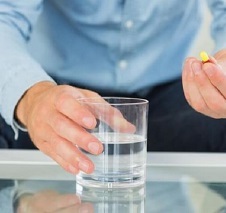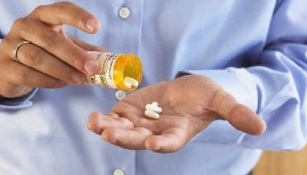
Antibiotics for chronic prostatitis are prescribed to eliminate the bacterial factors that cause inflammation of the glands.
The goal of antibiotic therapy is to relieve symptoms, prevent complications, and restore normal prostate function.
Funds are set by the attending physician based on test results. The common name "antibiotics" means several groups of drugs of various compositions with significant antibacterial activity.
True antibiotics are their natural (natural) or synthetic analogues.
Classification of chronic prostatitis
There are three main forms of chronic prostatitis:
- Chronic bacterial prostatitisis a lesion of the prostate gland associated with the development of pathogenic microflora. It persists with symptoms similar to acute prostatitis (pain during urination, the presence of pus and blood in the urine, etc. ), but has a more vague manifestation (facilitated).
- Chronic non-bacterial prostatitisis a type of prostate lesion in a man, caused by reasons other than pathogenic bacteria (e. g. , trauma or stone formation in the prostate), which are detected in infectious diseases. However, the name of the pathology is only related to the etiology of the disease, and not its path, because in the process of pathogenesis, the development of pathogenic microflora similar to other types of prostatitis is observed.
- Chronic asymptomatic prostatitisis a pathology of the prostate gland caused by the presence of pathogenic microflora in the prostate area and is asymptomatic or almost asymptomatic. Important! If this type of disease is suspected, as a rule, detected during diagnosis based on the presence of pathological phenomena such as leukocyturia and / or bacteria, additional diagnosis is required. This is due to the similarity of the course of chronic asymptomatic prostatitis with prostate cancer.
Therefore, regardless of the type of chronic prostatitis, the use of antibiotics is recommended in all cases. The drugs used in the appointment of therapeutic practices as drugs of choice will be discussed below. And you should start by offering antibiotics to the reader for a list of chronic prostatitis.
What antibiotics are available?
In recent years, the resistance of bacteria to certain drugs has increased sharply, therefore, before starting antibiotic treatment for prostatitis in men, it is necessary to examine patients for the entire group of STIs, and pathogenic flora to determine the resistance of microorganismsspecific to certain drugs.
What antibiotics are used to treat prostatitis at home? There are the following groups of antibacterial drugs (the best antibiotics for prostatitis in men):
- Penicillin.In the past, such antibiotics were actively used for prostate inflammation, with the advent of the most active antibacterial drugs, they practically lost their clinical importance, due to the increase in the number of negative bacteria resistant to penicillin.
- Macrolides.This antibiotic for prostatitis has a broad spectrum of action and low toxicity.
- Tetrasiklin. Has anti-gonococcal activity, chlamydia, mycoplasm. More often used in the treatment of chronic infectious prostatitis caused by the above pathogens.
- Fluoroquinolones.Often used for the complex treatment of chronic prostate inflammation, and for uncomplicated acute inflammation of the prostate gland (efficiency up to 100%). They have high activity and low toxicity (they do not interfere with the intestinal microflora).
- Cephalosporins.Actively used in the treatment of acute forms of bacterial prostatitis. These are good antibiotics for prostatitis, they have a high spectrum of action and activity against pathogenic bacteria.

At the same time, modern medicine uses antibiotics for prostatitis or other diseases because of its ability:
- quickly destroys the source of disease and eliminates inflammation;
- produces substances that kill or stop the spread of large bacteria and viruses, but are safe for macroorganism cells;
- acts when used externally (suppositories, ointments) and with other methods of administration: intramuscular, oral, intravenous;
- to fight simultaneously with many pathogens (broad-spectrum antibiotics).
What is the most effective antibiotic
To cure or reduce the symptoms of infectious prostatitis, strictly follow your doctor's recommendations. Start the course only after diagnosis, when the doctor understands the nature of the disease. Self-care at home is fraught with bad consequences, the body system does not function properly.
Recommendations for antibiotic therapy
Side effects of antibiotics can be as troublesome as exacerbating prostatitis.
Special disadvantages of each drug group:
- Penicillin: rash, dermatitis, diarrhea;
- Cephalosporins: diarrhea. Rash and fever are rare;
- Macrolides: nausea, vomiting. Occasionally colitis, cholestatic jaundice occurs;
- Fluoroquinolones: abdominal pain, diarrhea.
Diarrhea is the most common side effect of antibiotics. This is due to two reasons: an imbalance of the intestinal microflora, the growth of bacteria called Clostridium difficile. To prevent and get rid of diarrhea, you can take pro- and prebiotics in parallel.
Non-antibacterial therapy
In addition to antibiotics, the following treatments are used to successfully treat prostatitis, especially chronic prostatitis:
- prostate massage is the best method to improve blood circulation and remove inflammatory secretions from the prostate gland;
- physiotherapy;
- non-steroidal anti-inflammatory drugs - not used in parallel with fluoroquinolones;
- herbal preparations;
- alpha blocker.
In order to cure the disease effectively, it is necessary to perform a diagnostic that will show the type of bacteria that causes the disease in a particular patient, his sensitivity to drugs. Based on the test results, the doctor decides what method to treat chronic prostatitis or a form of acute disease.
























